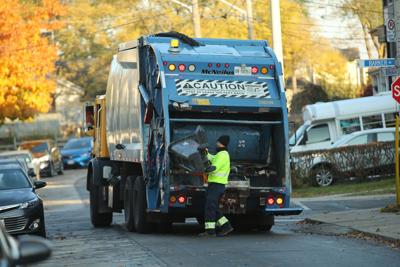The big number
$17.5 million
a high-end preliminary estimate for how much money the city of ╬┌č╗┤½├Į might save over five years by having unionized city staff take over garbage collection in part of the city.
Fourteen years ago, Doug Ford, freshly elected as a ╬┌č╗┤½├Į city councillor, laid out a blunt vision for the delivery of public services at city hall. ŌĆ£WeŌĆÖre going to be outsourcing everything that is not nailed down,ŌĆØ .
And while FordŌĆÖs tenure at city hall was brief ŌĆö and some services proved to be more thoroughly hammered into place than Doug and his brother, the late mayor Rob Ford, would have liked ŌĆö the general approach espoused by the guy who would later become premier has actually stuck around.
Since 2011, ╬┌č╗┤½├Į council has renewed and expanded contracts with private vendors for a range of basic public services, including garbage collection, litter pick-up, snow clearing, janitorial work, security guard services, tree pruning and sidewalk repair.
Lately, though, with Mayor Olivia Chow now calling the shots at city hall, the wisdom of the Fordian approach has finally started to get questioned.
Earlier this month, at a meeting of city hallŌĆÖs infrastructure and environment committee, councillors showing that the cost of continuing to outsource garbage collection is soon likely to be significantly higher than just doing the job internally.
Based on an analysis of the new five-year deal signed with waste collection Green for Life (GFL), in 2031 the city will spend about $45.7 million to have GFLŌĆÖs fleet of trucks collect trash in District 2, the area between the Humber River and Yonge Street. For comparison, the cost of having the city collect the same garbage with its own unionized employees is estimated at between $42.2 million and $44.4 million annually.
Over a five-year term ŌĆö the typical contract length under the current outsourced arrangement ŌĆö thatŌĆÖs a chance to bag between $6.5 million and $17.5 million in total savings.
The cityŌĆÖs cost estimate for in-sourcing, validated by an independent consultant, factors in the cost of buying a whole new fleet of trucks and procuring new yard space to process the waste. And the projected savings come even as city workers make significantly more than the workers employed by the private vendors.
Those numbers alone should probably be enough to prompt a vibe shift contrary to FordŌĆÖs ancient wisdom ŌĆö but wait, thereŌĆÖs more.
The infrastructure committee also . An analysis found that bringing the litter vacuum program in-house, with city-owned equipment and city workers sucking up the trash, would save about $1.8 million over five years.
Those are relatively small savings, but they also come with the promise of better service.
ŌĆ£Our view is that when city staff are doing the work, there is a higher duty of care thatŌĆÖs provided, and the staff will go above and beyond whatŌĆÖs typically in the job description,ŌĆØ explained Matt Keliher, the cityŌĆÖs longtime general manager of solid waste, at the committee meeting. ŌĆ£Whereas when we have contractors, we contract them to do a specific job, a specific route, a specific time, and we pay them for that role.ŌĆØ
That distinction has played a role in a lot of the stories weŌĆÖve heard about city hallŌĆÖs struggles of late.
The ability to effectively respond to major blizzards has been put on thin ice by the finer points of contracts signed with the corporate consortium responsible for operating the snow plows. Last year, a report found that the private companies contracted to prune city trees generate way more complaints than city crews. And the cityŌĆÖs contract to outsource supply and maintenance of on-street garbage bins, hailed as an ŌĆ£extraordinary opportunityŌĆØ when it was signed, has delivered famously frustrating results, with the supplied bins often packed to overflow and prone to failure.
Some of the blame is on the city. Many departments have never been great at contract management, too often trying to rewrite agreements midstream and not anticipating how needs might change over the course of a long-term deal.
But a bigger problem might simply be that thereŌĆÖs a fundamental mismatch between the complex and changing needs of a big city like ╬┌č╗┤½├Į and the capacity of the private sector in some important service areas.
The idea that there are always lots of private bidders ready to compete with each other to deliver public services at low prices has never really borne out. The latest contract for garbage collection in District 2, for example, . GFLŌĆÖs winning bid came despite an eye-popping 98 per cent annual increase over its previous contract for equivalent service.
A similar pattern has emerged across a lot of other city procurement: few qualified bids and escalating prices.
How Chow and ╬┌č╗┤½├Į council will adjust remains to be seen. Council is set to vote at its meeting this week on whether to bring litter collection back in-house. A vote on whether to start bringing more garbage collection back into the hands of the public sector will come much later, after staff conduct more analysis of the costs. These moves and others to give more responsibility to public sector unions have to be weighed against the possibility of labour disputes, like the one that led to ╬┌č╗┤½├ĮŌĆÖs very stinky garbage strike in 2009.
But thereŌĆÖs good reason to consider a departure from the old Ford ethos, where public services are best delivered by private companies. Maybe ╬┌č╗┤½├Į needs to aim higher than the lowest bidder.
Error! Sorry, there was an error processing your request.
There was a problem with the recaptcha. Please try again.
You may unsubscribe at any time. By signing up, you agree to our and . This site is protected by reCAPTCHA and the Google and apply.
Want more of the latest from us? Sign up for more at our newsletter page.
































To join the conversation set a first and last name in your user profile.
Sign in or register for free to join the Conversation